St. Agatha Shakespeare Workshop Report
by Dr. Andrew Seeley, President and Co-Founder of the Boethius Institute
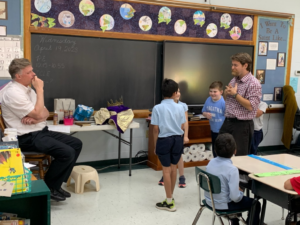 A dream come true! That is how I feel having just completed a very successful workshop on Shakespeare at St. Agatha Academy, an elementary school in Winchester, Kentucky. Over the course of two days, my colleague and I worked with all of their students and teachers from second through eighth grades, along with an extra session for their nascent theater guild (5th through 8th). Over the course of an hour and a half, we gave students an experience of what it is like to bring Shakespeare's words to life, one that has convinced me that Shakespearean drama can and should be a part of the life of every school.
A dream come true! That is how I feel having just completed a very successful workshop on Shakespeare at St. Agatha Academy, an elementary school in Winchester, Kentucky. Over the course of two days, my colleague and I worked with all of their students and teachers from second through eighth grades, along with an extra session for their nascent theater guild (5th through 8th). Over the course of an hour and a half, we gave students an experience of what it is like to bring Shakespeare's words to life, one that has convinced me that Shakespearean drama can and should be a part of the life of every school.
- We began by emphasizing that Shakespeare wrote to give his actors their lines, not to just be read. He gave almost no instructions, hardly any narrative, just the lines they were supposed to say. So reading Shakespeare is not like reading a novel. Readers of Shakespeare need to bring the words to life either by performing them or by imagining how they would be performed. What tone of voice should they use? When should they change their tone, or pause for a while? Where should they stand? Or should they sit? Should they be close to others on stage, or far away? Looking at them or away from them?
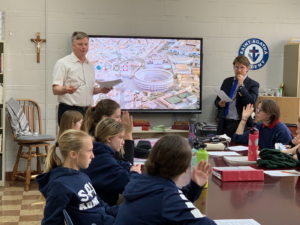 Shakespeare expected his actors to be able to imagine for themselves how they should act and react, and he gave them plenty of clues in his dialogue to help them. One of our goals was to help the students to begin actively to imagine how they might play their characters. We had decided ahead that we would use the opening scene of Hamlet as our base text. We received some excellent suggestions from Megan Lindsay, a Great Hearts teacher and professional actor who uses Shakespeare to teach her students how to read all kinds of literature.
Shakespeare expected his actors to be able to imagine for themselves how they should act and react, and he gave them plenty of clues in his dialogue to help them. One of our goals was to help the students to begin actively to imagine how they might play their characters. We had decided ahead that we would use the opening scene of Hamlet as our base text. We received some excellent suggestions from Megan Lindsay, a Great Hearts teacher and professional actor who uses Shakespeare to teach her students how to read all kinds of literature.
We began with small excerpts of two or three lines, such as:
- Francisco: I think I hear them. Stand ho! Who is there?
- Marcellus: Friends to this ground.
- Horatio: And liegemen to the Dane.
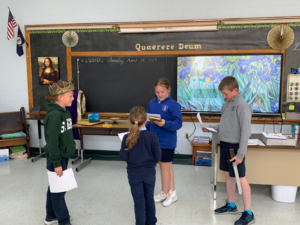 All we told them about the play was that it is a ghost story; we did not offer any explanation of where or when or why the characters were speaking. We divided the students into groups of four or five, so everyone would have a part. We discussed each excerpt with the students, asking questions and making suggestions that helped them make sense of the language and begin to imagine how they might play it. It helped that they were in a classical school – they had had a lot of exposure to history and vocabulary, as well as active discussion. They quickly realized that, in the first excerpt, Francisco is a guard of some sort, that he first hears Marcellus and Horatio, then challenges them. Horatio's response was tricky. I connected “liegemen” with the Pledge of Allegiance, and then explained a little bit about feudal oaths in that light. Some of them realized that “Dane” means someone from Denmark, though not all.
All we told them about the play was that it is a ghost story; we did not offer any explanation of where or when or why the characters were speaking. We divided the students into groups of four or five, so everyone would have a part. We discussed each excerpt with the students, asking questions and making suggestions that helped them make sense of the language and begin to imagine how they might play it. It helped that they were in a classical school – they had had a lot of exposure to history and vocabulary, as well as active discussion. They quickly realized that, in the first excerpt, Francisco is a guard of some sort, that he first hears Marcellus and Horatio, then challenges them. Horatio's response was tricky. I connected “liegemen” with the Pledge of Allegiance, and then explained a little bit about feudal oaths in that light. Some of them realized that “Dane” means someone from Denmark, though not all.
Then we let them go off and (quite literally) play with it. We gave them five minutes or so to plan and practice. That worked beautifully! While most of the students were quiet and reticent in the discussion, once they were working with their friends, they threw themselves into playing enthusiastically. After that, we were able to see what they came up with and then give directorial suggestions about how they might bring it more to life. Often that took the form of questions: How do you react when you see the ghost? How are you going to show that – on your face? in your posture? in your movement? How should the ghost walk? Where should he walk? How fast?
By the end of a half hour, we had the different groups perform for each other, sometimes different excerpts, sometimes the same ones. One group even imaginatively put all three excerpts into a continuous story. They eagerly divided simple props among themselves – crown, swords, shield, book. Next we moved on to longer selections of ten to twenty lines. We discussed some difficult portions with the whole group, and then went through the same process. This re-energized them, and filled out the rest of our time.
Because we wanted to keep the groups small, on the first day, we had the teacher take one of the groups. But we realized that meant she wasn't able to watch us work with the students. So on the second day, we made the initial groups larger so the teachers could get a sense of what we were doing, only later dividing the groups and having the teachers guide one. That worked much better.
We worked with the theater group on the first day. Though the school has long had students memorize and recite selections from Shakespeare, and even read some of his plays, they have only recently begun acting, though the initiative of the two of the teachers, neither of whom has had experience with drama. (One said she felt like a fraud, because she didn't know anything. I could sympathize, since I also began my amateur directing career without any acting experience.) The year before, the fourth grade teacher had her class perform a short version of Romeo and Juliet. More than half of them joined the theater guild when it started this year. They performed Aeschylus's Oresteia trilogy in the fall, and then Julius Caesar in the spring.
The directors picked out a series of scenes from Julius Caesar for the students to perform for us, beginning with the conspirators meeting. After watching a portion, we gave them basic, fundamental directions – don't move your feet when standing, slow down your speech, be loud, pause at commas and periods, add movement between lines. One student remarked that he never realized he was supposed to still be acting when he wasn't talking, and he found the idea exciting. To begin to figure out how and when to speak, or move, or react, we had to ask them to tell us what the words meant. One actor with a major role said he had no idea. But once we started asking him about particular words and sentences, he came to understand much better. By the end, not only had the scenes improved significantly, but the actors realized it themselves.
Thank you for your workshop with our theatre guild. It was fantastic. The kids were ecstatic with how much do they learned. The student who played Brutus even showed me her notes.
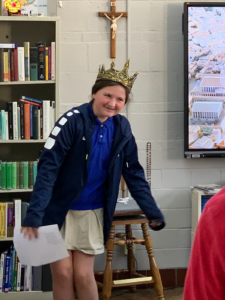 My colleague had very dramatically given each actor a pencil, emphasizing that they must regularly make notes on their scripts of everything that they decided to do, so that they could remember it the next practice. Since we worked with the fifth grade class the next day, we were able to see as they worked out their Hamlet portions that many retained what they had learned from us.
My colleague had very dramatically given each actor a pencil, emphasizing that they must regularly make notes on their scripts of everything that they decided to do, so that they could remember it the next practice. Since we worked with the fifth grade class the next day, we were able to see as they worked out their Hamlet portions that many retained what they had learned from us.
The directors watched us through all this, taking their own notes. We had met with them earlier in the day, telling them of our own experiences as directors. We made special mention of the difficulty most new actors, especially the young, have of imagining what they look and sound like to others. They can't tell that they are rushing all their lines so the audience can't understand them; they have had no experience of speaking at the slow, deliberate pace demanded by acting. The directors need to help them imagine themselves as they look and sound, and as they might look and sound, and then confirm them when they have improved. “The purpose of playing is...to hold, as 'twere, the mirror up to Nature;” a purpose of directing is to hold a mirror up to actors.
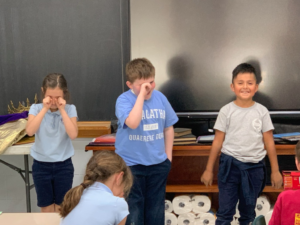 With the younger grades, we took a different approach. For 10 years, every second grade student at St. Agatha's has learned by heart to recite the first 35 lines of Mark Antony's funeral oration from Julius Caesar. The wall is lined with placards that give the name of each of this year's students and the date of their first recitation. The classes recited the lines for us together, clearly and well; few even of the third graders needed any prompting. We then took a few lines from the speech to mime – Julius Caesar bringing captives back to Rome, weeping with the poor, and refusing the crown on the Lupercal. The students had a great time, and had their first introduction to playing Shakespeare.
With the younger grades, we took a different approach. For 10 years, every second grade student at St. Agatha's has learned by heart to recite the first 35 lines of Mark Antony's funeral oration from Julius Caesar. The wall is lined with placards that give the name of each of this year's students and the date of their first recitation. The classes recited the lines for us together, clearly and well; few even of the third graders needed any prompting. We then took a few lines from the speech to mime – Julius Caesar bringing captives back to Rome, weeping with the poor, and refusing the crown on the Lupercal. The students had a great time, and had their first introduction to playing Shakespeare.
St. Agatha's is well on its way to becoming a school in which Shakespeare lives. Even the kindergartners are getting started, their teacher having them recite in turn single portions of Jacques' Seven Ages of Man speech, such as: “And then the justice In fair round belly, with good capon lin'd,.” We are hopeful that our two days’ work helped them experience in Shakespeare the joy that they have to expect from all that they learn.
